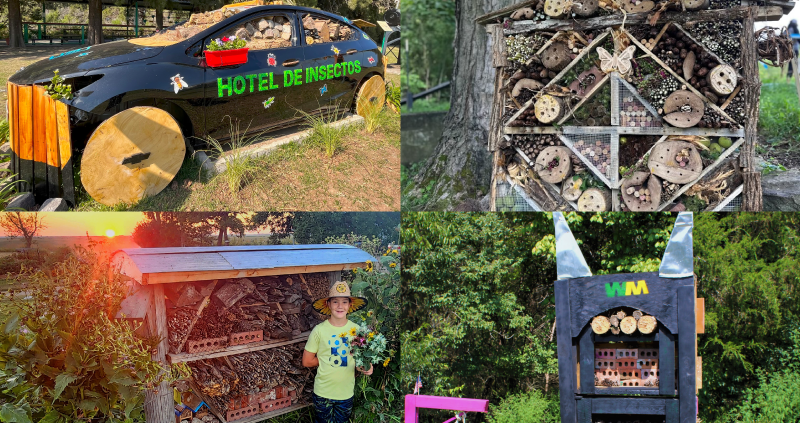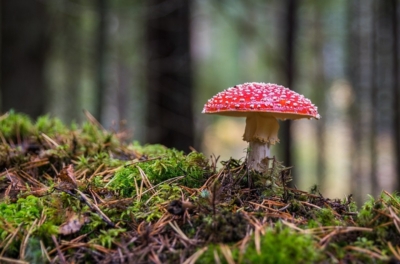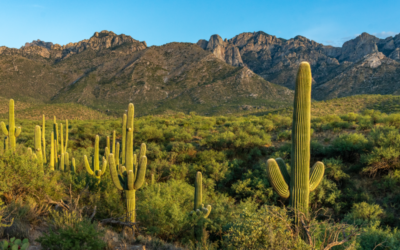WHC Recognizes Excellence in Insect Hotel Construction
BETHESDA, Md., November 15, 2023 – WHC (Wildlife Habitat Council) announces the winners of its 2023 Insect Hotel Challenge. WHC invited corporate members, partners and community organizations to submit their insect hotel designs illustrating the creativity and innovation of this conservation effort. Insect hotels provide habitat for bees, beetles and other insects, with items like hollow tubes, leaves and bark offering shelter and nesting space.
The contest received 21 entries from corporate conservation teams, youth organizations and individuals working to support local insect and pollinator populations. WHC determined a winner for each of the following categories: large-size hotel, small- to mid-size hotel, use of found materials and renovation of an existing hotel. Congratulations to the winners:
Best Large-Size Hotel – General Motors Argentina
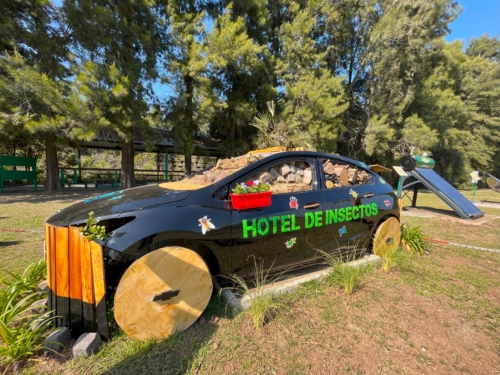
Located on the grounds of the GM Rosario Plant in Santa Fe, Argentina, this bug hotel was housed in the body of a car that was going to be disposed of. Instead of throwing it away, employees repurposed the car into a hotel filled with wood pallets, logs with pre-drilled holes, nesting tunnels, twigs, bark and the remains of other vegetation.
“We are thrilled about our first place in the Insect Hotel competition, an achievement that reflects our commitment to sustainability and creativity,” said Norberto Tinazzo, GM Sustainability Engineer. “This project highlights our passion for sustainability and demonstrates that innovative solutions can emerge from unexpected situations. We take pride in having created something meaningful for the environment and hope it inspires others to adopt sustainable practices to preserve our planet.”
Best Small- to Mid-Size Hotel – Olympus Energy
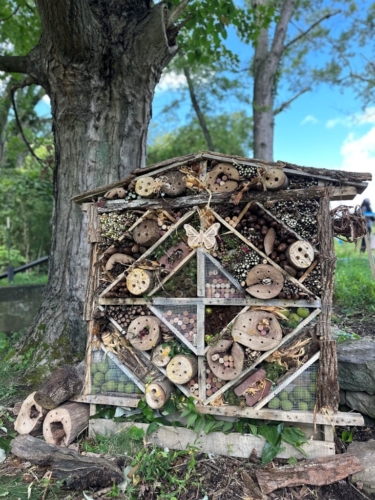
Olympus Energy used this insect hotel to supplement an existing pollinator garden at its site in Jeannette, Pennsylvania. Volunteers supplied recycled materials found at their homes or at work sites, including bricks, wooden pallets, pinecones, walnuts, woody stems and untreated logs. The design of the hotel was inspired by a previous farmhouse and barn on the property to honor the past while creating a new structure for the future.
“Olympus is proud to participate in projects that support biodiversity and sustainable ecosystems in the communities where we operate,” said Laura Karosic, Environmental Compliance Manager with Olympus. “Building an insect hotel was a fun and creative way to further support populations of native bees and other beneficial insects on our WHC-Silver Certified pollinator garden on the Gaia Well Pad property.”
Best Use of Found Materials – Conservation Blueprint
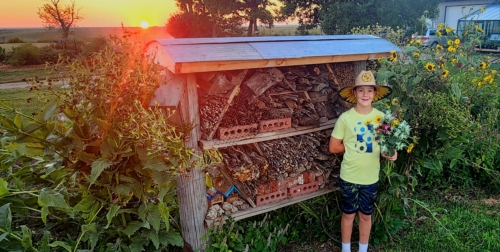
The construction of this insect hotel in Saint Paul, Nebraska, was a collaborative effort, drawing on the skills of an entire family. Situated in the middle of a wildflower garden at prairie conservation company Conservation Blueprint, this hotel provides shelter for native bees and wasps. The design incorporated dried milkweed pods, mud rock with holes, bark, cut stems from the last growing season, bamboo sticks and pieces of tin roofing from an old barn. By the halfway point of the construction process, the hotel was already being used by pollinators.
“When I first heard about the contest, I wasn’t sure I was up for the challenge,” said student Jared Mack, who worked with his parents and siblings on the construction of the hotel. “I knew, however, that people (and insects) were counting on me. One of my favorite moments of the whole thing was when I had finished putting in the bamboo sticks and called it a day. Then, when I got back up to the site to work on it again, there were already insects living inside!”
Best Renovation of an Existing Hotel – WM Southern Services Landfill
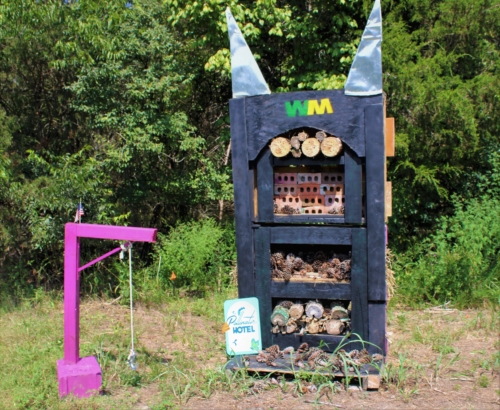
WM chose to renovate an existing bug hotel at its Southern Services Landfill site in Nashville, Tennessee. The team modeled the hotel after Nashville’s AT&T Tower, also known as the “Batman Building,” doubling the height of the existing bug hotel and adding pointy “ears” to match the famous skyscraper. Intended for bees, butterflies, wasps and beetles, the hotel includes pinecones whose sap attracts specific insects.
“We are thrilled to receive this recognition for our insect hotel,” stated Kerrington Howard, who helps lead the WHC project. “This award is a win for the environment and the beneficial insects that will find a safe haven in our hotel. We believe small actions make a big difference, and this insect hotel is one of the steps WM is taking to further its commitment toward biodiversity and a more sustainable future.”
Insect hotels not only provide crucial shelter for wildlife, but they also offer opportunities to involve community members in the hotel’s construction and educate young people about the importance of conserving insects. Through these projects, conservation teams are inspiring and educating a new generation of environmental stewards.
About WHC:
WHC (Wildlife Habitat Council) has been working at the nexus of business and biodiversity for 35 years and is the only international NGO focused exclusively on enabling private sector action for nature. WHC’s corporate members are leading national and multi-national corporations, and their collective efforts have resulted in more than 1,500 WHC-certified programs around the world. Learn more at www.wildlifehc.org.
